Urban Lotus
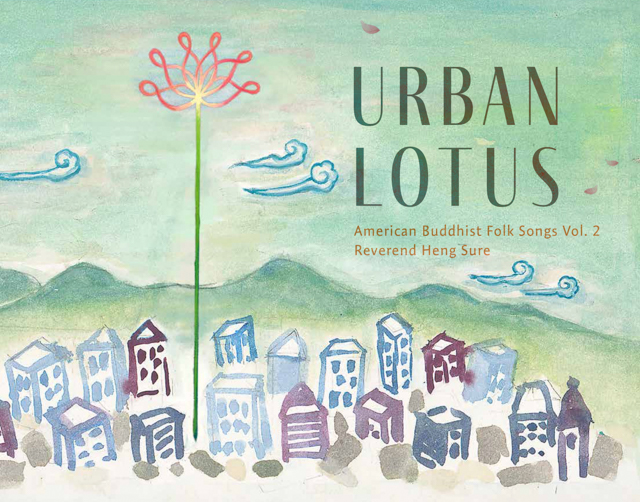
About the Album
Buddhism came to California a century ago. One of Buddhism’s symbols is the lotus flower. Lotuses are rooted in the mud but their blossoms stand above the mud, pure and undefiled. The heart of the Mahayana’s hero, the Bodhisattva, or Awakened Being, is the same way. Bodhisattvas keep a pure heart while living in the muddle of the mundane world.
Chan Master Hsuan Hua (1918-1995) opened monasteries in the heart of major urban cities up and down the West Coast: San Francisco, Los Angeles, Sacramento, San Jose, Berkeley, Seattle, Vancouver, Calgary, and elsewhere. He trained Western monks and nuns to become like lotuses and bloom amid the concrete city sidewalks. He himself was a songwriter and he challenged his disciples to rewrite the daily ceremonies, chants, and praises to accord with the musical tastes of the contemporary West. This album, Urban Lotus, Urban Lotus is our second go at setting the Buddha’s Dharma teachings to Western melodies, played on 6 and 12-string guitars, banjos and an octave mandolin.. Please make these tunes your own and watch a lotus bloom!
Download Music
Dharma Radio music album can be purchased through Bandcamp, Apple Music, Spotify, Amazon Music, YouTube Music and more starting July 13, 2025.
Songs Preview
Notes and Lyrics of the Songs
Music: Robert Wadsworth Lowry, “How Can I Keep From Singing”
Lyrics: Rev. Heng Sure
“How Can I Keep From Singing?”, a favorite Christian hymn, praises the power of music to calm the heart in times of trouble. The method of reciting the Buddha’s name works the same way. The vows of the Buddha Amitabha take us to a world free from pain and suffering.
A Buddha named Eternal Light
Made vows to save creation
He made a land where suffering’s gone A place of liberation
So use his vows and be reborn
In lotus flowers delighting
You simply keep his name in mind
And never stop reciting
The Saha land is a place of pain With struggle and contention
To find a world of Utmost Bliss You first set your intention
Those men or women, rich or poor In rebirth not delighting
Apply themselves with a single mind And never stop reciting
I praise the Buddha’s compassionate vows With melodies unending
My body lives in the world of woe
My heart is world-transcending
With Bodhisattvas joyfully I’ll soon be reuniting
Until I reach Amitabha’s land I’ll never stop reciting
Namo Amita Buddha Namo Amita Buddha Namo Amita Buddha Namo Amita Buddha Namo Amita Buddha Namo Amita Buddha I’ll never stop reciting
Music & Lyrics: Jennifer Berezan
Bodhisattva Guan Shi Yin is the most beloved of all the figures in Mahayana Buddhism. Guan Yin is the Awakened Being who hears the sounds of the world, sounds of joy and sounds of suffering alike. She extends a hand to anybody who is in need, as long as you call on her name. When we say, “Namo Guanyin Bodhisattva,” she carries us to the other side, and delivers us from our troubles.
The song was written by Jennifer Berezan, a Canadian-American musician who lives in Berkeley, California. Wherever I am in the Buddhist world, from China to Taiwan, from Singapore to San Francisco, people hear in this song a compassionate spirit of Guanyin Bodhisattva. She Carries Me is a favorite.
She is a boat
She is a light
High on a hill
In the dark of night She is a wave
She is the deep
She is the dark
Where the angels sleep When all is still
Where peace abides She carries me
To the other side
She carries me She carries me She carries me To the other side
She carries me She carries me She carries me To the other side
And though I walk Through valleys deep And shadows chase me In my sleep
On rocky cliffs
I stand alone
I have no name
I have no home
With broken wings
I long to fly
She carries me
To the other side
She carries me She carries me She carries me To the other side
She carries me She carries me She carries me To the other side
Music: Rev. Heng Sure
Lyrics: The Flower Garland Sutra translated by Rev. Heng Sure
This verse comes from The Flower Garland Sutra, The Avatamsaka Sutra and it’s from a bodhisattva, an awakened being whose name is Samantabhadra. Samantabhadra is the awakened being who looks over our good deeds and our bad deeds, the results of all the actions we do in our lives. He’s called The Repentance Host and so his verse from the last chapter of The Flower Garland Sutra says, “For all the harmful things that I’ve done, with my body, speech and mind; from beginningless greed, anger and stupidity, through lifetimes without number, to this very day, I now repent and I vow to change entirely.” With this verse we step into our lives and take charge of our karmic scorecard, so to speak, we become the architects of our future. By going in and saying, “No, I am going to clean up, I know what I’ve done in the past and I’ve hurt a lot of people myself and now is the time to turn around and take charge, be a blessing in the world.” This is the verse that inspires us to continue with that good work.
For all the harmful things I’ve done
With my body, speech, and mind
From beginningless greed
Anger and stupidity
Through lifetimes without number
To this very day
I now repent and I vow
To change entirely
For all the harmful things I’ve done
With my body, speech and mind
From beginningless greed
Anger and stupidity
Through lifetimes without number
To this very day
I now repent and I vow
To change entirely
For all the harmful things I’ve done
With my body, speech and mind
From beginningless greed
Anger and stupidity
Through lifetimes without number
To this very day
I now repent and I vow
To change entirely
I now repent and I vow
To change entirely
Music: William Walker, “Amazing Grace”
Lyrics: Traditional Verse translated and adapted by Rev. Heng Sure
This song is called “Praise the Buddha.” It comes from a song that in our tradition we do once a year on Buddha’s birthday every year, and that’s too bad because it’s such a good song. I translated the song out of Chinese into English and it was too short, so I added some verses. There’s a melody that probably if you had to say, “What is the most popular American melody that has Christian origins?” It would be “Amazing Grace.” So I happily borrowed the tune of “Amazing Grace” for “Praise the Buddha.”
Upon the earth, below the sky
The Buddha has no peer
In ten directions everywhere
He is beyond compare
He’s gone beyond duality
He’s never born again
With wisdom bright he blesses me
He knows my joy and pain
He walked the noble middle way
With strength and purity
In dark of night and light of day
His kindness touches me
He’s not divine, but he’s awake
He’s neither come nor gone
I find him in each blade of grass
He is the wisdom sun
I’ve searched around this whole wide world
And now I can declare
You’ll never find a wiser one
Than Buddha anywhere
You’ll never find a wiser one
Than Buddha anywhere
Music & Lyrics: Rev. Heng Sure
In the northern tradition, the Mahayana tradition, we have more than one Buddha that we celebrate. One of the most celebrated Buddhas is named; Medicine Buddha, the Healing Buddha, Bhaisajyaguru is his name in Sanskrit, 藥師佛 Yao-Shi-Fo in Chinese. He has three names; he is the Medicine Master, we translated YaoShiFo from the Chinese. He is also called The Buddha Who Dispels Calamities and Lengthens Life. People will recite this Buddha’s name, read his Sutra and draw pictures of him to bring that presence, that healing presence into their life. He has a third name which is The Buddha of Lapis Lazuli Light because this Buddha is associated with the color blue, blue light like the stone lapis lazuli. So he has three names and the way you access, the way you get to the energy of this Buddha is through his name. I put it into a banjo tune so people can get to know the Medicine Master Thus Come One. Thus Come One is the translation of Tathagata, the being who arrives.
Medicine Master Thus Come One
Namo Namo
Medicine Master Thus Come One
Namo Namo
He dispels calamities and lengthens life
Namo, Namo
He dispels calamities and lengthens life
Namo, Namo
Medicine Master Thus Come One
Namo Namo
Medicine Master Thus Come One
Namo Namo
Buddha of Lapis Lazuli Light
Namo, Namo
Buddha of Lapis Lazuli Light
Namo, Namo
Medicine Master Thus Come One
Namo Namo
Medicine Master Thus Come One
Namo Namo
Medicine Master Thus Come One
Namo Namo
Medicine Master Thus Come One
Namo Namo
Music and Lyrics: Traditional Buddhist chants
The most popular form of Buddhist practice in Buddhist East Asia is reciting the name of the Buddha Amitabha. His name is Limitless Light. In Sanskrit we say “Na Mo” which means I take refuge, I find my security, my true homeland security in the Buddha of Limitless Light. This Buddha made vows that said if you recite his name at the time of death you can go to his Pure Land, a paradise where there’s no suffering. All suffering is over in that place, the place where you cultivate to ultimate awakening, to Buddhahood. The way you get there is to recite his name, Na Mo Amitabha and in Chinese Na-Mo-A-Mi-Tuo-Fuo. More people practice this way than any other way, including meditation. This is the most popular practice. I thought, while devotional Buddhism may not catch on in the west right away, but I thought if we can, dress it up in Western sounds, in sounds familiar to us, maybe that’ll take us a step closer to the practice of devotion in the Buddha Amitabha.
Namo Amita Buddha…
Namo Amitabha…
Music & Lyrics: Rev. Heng Sure
Young people mostly through their teenage years, have a challenge reaching out and feeling grateful for what their parents do for them. That’s a time of maximum restraint and limitation, lots of “no, or you can’t, or you better not, or else,” and that’s a perfect time for young people to hear the message of the song. Which is to say, “Hey I’m actually feeling glad for my mom and dad,” in real terms and for such things like food and shelter and all. In the Buddha’s teaching, recognizing the kindness that has been done for us and the goodness that has been given to us is a major step towards reconnecting with the goal, being great compassion. “Hey, I’m feeling glad” for my mom and dad, not only for my parents but also for the kindness given to me by teachers both secular and spiritual. Also gratitude for the planet that we live on, all the food, the water and the beauty and the support given to us by the planet. So, there are plenty of places to feel grateful and this is a song that just keeps that front and center.
Thank you Mom
For your love and care
Thank you Dad
For letting me stay here
Hey, I’m feeling glad for my Mom and Dad
This morning my mom said
‘You’ve got to pay me for my cooking
Three meals a day
For the last nine…24…37… years
You got to pay for what you eat
No more freebie treats
There’s a padlock on the kitchen
I’m not your maid.’
Well, I can’t pay
But I can start by being grateful
Thank you Mom
For your love and care
Well, thank you Mom and Dad
I didn’t know how good I had it
Hey, I’m feeling glad for my Mom and Dad
This morning my dad said
‘You got to pay me for my driving
Gas ain’t cheap
And there’s wear and tear
I’m going to charge you for every night
You’ve been sleeping underneath my roof
Your bed’s out on the driveway
Your iPhone is there.’
Well, I can’t pay
But I can start by being grateful
Thank you Dad
For letting me stay here
Well, thank you Mom and Dad
I didn’t know how good I had it
Hey, I’m feeling glad for my Mom and Dad
This morning my teacher said
‘I’m not interested in teaching
Nobody listens
It’s just a waste of time
I’m not puttin’ on a show
You’ve got to pay for what I know
Learn it or lose it
That’s the way it goes.’
Well, I can’t pay
But I can start by being grateful
Thank you teacher
For letting me learn here
Well, thank you Mom and Dad
I didn’t know how good I had it,
Hey, I’m feeling glad for my Mom and Dad
This morning the earth said
‘You’ve got to pay me for my growing
All those crops
For all those years
You cut down all my trees
You waste me as you please
I’m fed up
You humans got to go (Don’t mention earthquakes)
I can’t pay
But I can start by being grateful
Thank you earth
For your love and care
Well, thank you Mom and Dad
I didn’t know how good I had it
Hey I’m feeling glad
Hey I’m feeling glad
Hey I’m feeling glad for my Mom and Dad
Dedicated to Joanne Shenandoah
Music & Lyrics: Rev. Heng Sure
One of my musical inspirations is a woman named Joanne Shenandoah, who is an Iroquois from the Haudenosaunee community in Upstate New York. She’s the granddaughter of Chief Shenandoah of the Iroquois community. Joanne is, in some circles, called the voice of Native America. She inspired me to put this song down as I recalled my own ancestors and their behaviors. They invaded this new land and claimed it for themselves. Joanne is a voice for peace and for reconciliation and for transcendence of differences. The song is dedicated to her.
In the distant past
Ancestors fought a war
The grievances flowed on from generations
The curses and the lies
The vengeance and the blood
Their children and their children learned the hatred
Your nation in the valley
My family in the hills
The strangers on the plains beside the river
Your color and your clothes
Your language and your ways
Kept us far apart from one another
In the past there was violence
Now we are related
And violence is no more
Before we met
There was hatred
Now we are related and hatred is no more
Then your daughter fair
Met my eldest son
Then I traded baskets for your silver
Then I saw you laughing
Then I heard your songs
Then we shared a meal beside the river
Now the ancient lies
Vanish in the sun
Now my eyes awaken to the vision
Now I see the ties
Now I see the kin
Now I see the future of our nation
In the past
There was violence
Now we are related
And violence is no more
Before we met
There was hatred
Now we are related
And hatred is no more
Music & Lyrics: Rev. Heng Sure
Check the label on your toothpaste tube: why is there sweetener in a product that reduces tooth decay? Addiction to sweets is a sign of an unhealthy society; childhood onset diabetes is a national health epidemic. Even the military is having difficulty recruiting men and women for the armed services who are not overweight, and sugar is a primary cause of the problem. I wrote this song to help me get past my own sweet-tooth. I sing it like a mantra when I’m tempted by a second piece of cake. The Buddha teaches that all dharmas are ultimately equal. Sugar is not to blame! It’s the mind and body that attach to things we love and things we hate.
Sugar is this Bhikshu’s bane
Just one bite can fog my brain
One sweet cookie melts my spine
Gets me high as quick as wine
I’m singin’
The sweet-tooth blues
Turned by sugar that I ate
I forget to cultivate
Red of face and short of breath
Unconcerned by birth and death
Singin’
The sweet-tooth blues
Sugar makes my thoughts run on
‘Til concentration’s lost and gone
Makes me want to laugh and play
And wander from the Middle Way
‘Til I’m singin’
The sweet-tooth blues
People like it good and sweet
We sweeten everything we eat
Read the label, yes it’s true
There’s sweetener in the toothpaste, too
Colgate’s got us singin’
The sweet-tooth blues
Sugar used to taste just great
Now I would rather concentrate
I won’t eat another dose of
Dextrose, fructose, and sucrose
Gotta kick ‘em
The sweet-tooth blues
People like it sweet and good
We sweeten nearly all our food
Tell me Doctor, who’s at fault?
Who put Dextrose in the salt?
Sun-dried, iodized
Sweet-tooth blues
But one day to be really true
I’ll put down no sugar, too
Until then I am glad to be
Bittersweet and sugar-free
You and I
We can be
Bittersweet
And sugar-free
Music: Traditional-African American kids’ ring game song, “Green, Green Rocky Road”
Lyrics: Martin Verhoeven
On a pilgrimage that I did from South Pasadena, California in LA up to Ukiah with a companion, another monk; we bowed every three steps, and did a prostration to the ground. It took two and a half years and 800 miles, and probably a million or more bows to get there. To keep our spirits up, we occasionally would write songs and sing them to ourselves and let the energy of the song carry us through the down days. So this is one of those, it’s set to the melody of “Green Green Rocky Road”.
Return the light and turn around
Found a penny on the ground
Met a friend I always knowed
Bowing down on a rocky road
Bow down and turn around
Look inside and see
Is it black or white?
Is it up or down?
Is it in the sky?
Is it on the ground?
Bow down and turn around
Look inside and see
Leave the beaches find the gate
Hurry up now, don’t be late
Leave the false and find the true
Ten thousand Buddhas inside of you
Bow down, turn around
Look inside and see
Return the light and turn around
Found a penny on the ground
Met a friend I always knowed
Bowing down on a rocky road
Bow down and turn around
Look inside and see
Music & Lyrics: Rev. Heng Sure
This song was written for the United Religions Initiative, otherwise known as URI. It expresses the global vision of religions that are post tribal. Our planet cannot hold that tribal view any longer, this is a global village. Our religions should become good neighbors, in harmony with each of us, each of our faiths. There’s a line in here that comes from The Peacemaker of the Iroquois. The Iroquois story; the original, the first residents, the First Peoples of this land called Turtle Island, were at war with each other. The peacemaker Hiawatha put them all together and made everybody take their weapons and bury them beneath the great white tree of peace. They invited an eagle with all due respect, to sit on top of that tree and make a great sound as soon as he saw any one of the tribes, sneaking over to dig up the weapons and go back to war. They’re the united Iroquois Confederacy, former warlike tribes. It became the foundation of The United States Constitution studied by the founding fathers and that verse appears in the United Religions, URI song, so listen for it.
You are I
We are one
Reunited
We become
If the religions of the world could sit
For just one hour in harmony
What a peaceful happy world
That hour of harmony would bring
If the leaders of all faiths agreed
To share their hearts in honesty
What a model for the world
Their friendship and integrity
You are I
We are one
Reunited
We become
And when the children of the world agree
To teach their elders harmony
What a joyful laughter in
That lesson to humanity
When the people of the world agree
To be the change they wish to see
What a peaceful, happy place
This world of suffering could be
You are I
We are one
Reunited
We become
And when the nations of the world agree
To bury guns beneath the tree
What a blessed celebration
The end of death by guns would bring
When the URI guides society
To religious hospitality
Happiness abides within
That commonwealth of harmony
You are I
We are one
Reunited
We become
Reunited
We become
Music & Lyrics: Rev. Heng Sure
This song is called “Set It Down.” It arose from a gathering in Antwerp, Belgium of the United Religions Initiative. We had just heard the story of one of our courageous young leaders from Uganda, who went out into Northern Uganda where Lord’s Resistance Army was kidnapping young people and turning them into bloodthirsty soldiers and drug addicts. They’ve been teaching 12 year olds how to kill with machine guns and chop children’s hands off and things like that. She was testifying how she goes out and uses religions to cross these boundaries that before were ironclad. She demonstrated how there was benefit to all when you make friends across religious borders in the face of the terror of The Lord’s Resistance Army. Her name is Despina. Despina said the hardest thing is to get people to forget the old stories; to set aside the slights and the insults that have been in front of people, for sometimes generations, “so and so stole a cow a hundred years ago and we have never forgiven them.” The song was born from that idea that, “God taught us forgiveness, heaven holds us all. Nevermind who hit who first, be still and hear the call. O set it down, set it down, set that vengeance down. Set it down, set it down, set the vengeance down. Some say bad religion is worse than none at all. Anyone who teaches hate, someday is bound to fall. O set it down. To free your mind of hatred, makes you truly great. All your ancestors rejoice when you put an end to hate. Oh set it down. Coal turns into diamonds, there’s diamonds in the coal. Hell turns into heaven when there’s forgiveness in your soul. Oh set it down, set it down.” That’s the song. It was a hit in Antwerp and it’s a song we need to sing a little more often.
God taught us forgiveness
Heaven holds us all
Never mind who hit who first
Be still, hear the call
O set it down, set it down
Set that vengeance down
O set it down, set it down
Set that vengeance down
Some say bad religion
Is worse than none at all
Anyone who teaches hate
Some day is bound to fall
O set it, down set it down
Set that vengeance down
O set it, down set it down
Set that vengeance down
To free your mind of hatred
Makes you truly great
All our ancestors rejoice
When we put an end to hate
O set it down, set it down
Set that vengeance down
O set it down, set it down
Set that vengeance down
Coal turns into diamonds
There’s diamonds in the coal
Hell turns into heaven
When there’s forgiveness in your soul
O set it down, set it down
Set that vengeance down
O set it down, set it down
Set that vengeance down
Music: Loreena McKennit, “The Dark Night of the Soul” from the Quinlan Road
CD The Mask and Mirror. Published by Quinlan Road Music Ltd (SOCAN/BMI).
www.quinlanroad.com
Lyrics: Traditional Buddhist Hymn translated and adapted by Rev. Heng Sure and Bhikshu Heng Lyu
“Dedication of Merit” is a way to share the goodness of enjoying music together. The music and the harmony that it brings create something called virtue and merit. It’s a force, actually the ancients called it the only force that can cut without harming. When someone has virtue, they can mold the world to their will and no one minds, nobody objects. When we hear this song, take the opportunity to send out a wish for goodness, however you would like to make a better world. In Judaism they say, “Tikkun Olam,” you repair the world. That makes it, you being here, my being here, worthwhile. So let’s make a wish, however you would like, to make a better world. Share the goodness of music with people, who are hungry for the goodness that we know and enjoy so freely. Let’s share it with everyone.
May every living being
Our minds as one and radiant with light
Share the fruits of peace
With hearts of goodness, luminous, and bright
If people hear and see
How hands and hearts can find in giving, unity
May our minds awake
To Great Compassion, wisdom and to joy
May kindness find reward
May all who sorrow leave their grief and pain
May this boundless light
Dispel the darkness of our endless night
Because our hearts are one
This world of pain turns into Paradise
May all become compassionate and wise
May all become compassionate and wise
Music & Lyrics: Rev. Heng Sure
This song is called “Wedding Blessing.” It’s also known as “Dana Paramita,” the perfection of generosity, giving that takes one across, dana paramita, the perfection of giving. It was written for a wedding of a couple that were central and still are central in our community. The wedding took place down in Madurai, South India and there was a large number of friends and family in the community who couldn’t make it over to India to celebrate the wedding. But we knew the time that the wedding was happening and this is an Indian wedding that takes place over many days. So we all got together in the monastery in Berkeley and sat in silence in a circle and put our hearts together and sent off good wishes to the couple. This song emerged from that meeting, as a memorial, is a commemoration and a celebration of their happy wedding. Since that time, we’ve brought it out at appropriate moments to send off other folks-happy weddings. Here it is, this song is called “Wedding Blessing.”
Dana Paramita
Dana Paramita
Dana Paramita
Dana Paramita
Let my eyes see
Let my heart learn
Let my hands give
Let my feet serve
Make our roof into a refuge
Make our floor a Bodhimanda
Make our hearts into a shelter
Make our eyes into a beacon
Dana Paramita
Dana Paramita
Dana Paramita
Turn ourself into the selfless
Turn our passion to compassion
Turn our seeking into service
Turn our love to liberation
Dana Paramita
Dana Paramita
Dana Paramita
Dana Paramita
Let our deeds reflect the Dharma
Let our words resound with wisdom
Let our thoughts be filled with kindness
Let our hands bestow compassion
Dana Paramita
Dana Paramita
Dana Paramita
Dana Paramita
May this family be a blessing
May these children love their parents
May these elders teach with patience
May this house contain the world
Dana Paramita
Dana Paramita
Dana Paramita
Dana Paramita
Let my eyes see
Let my heart learn
Let my hands give
Let my feet serve
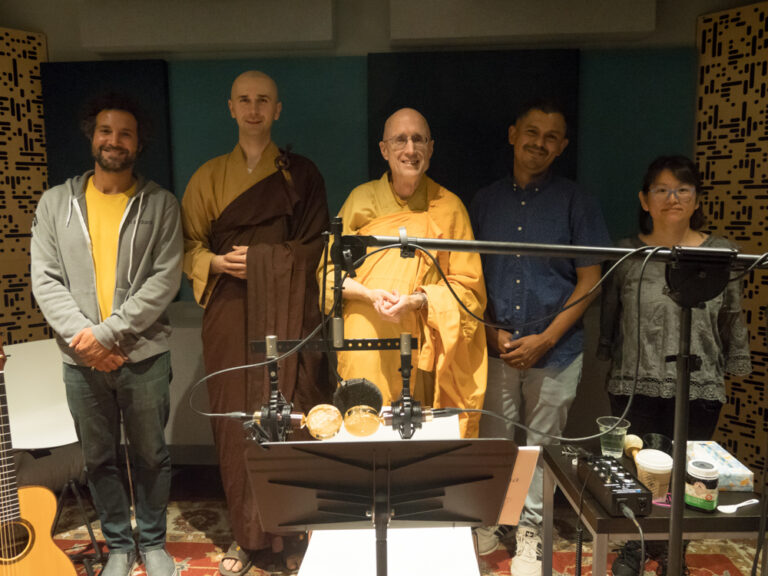
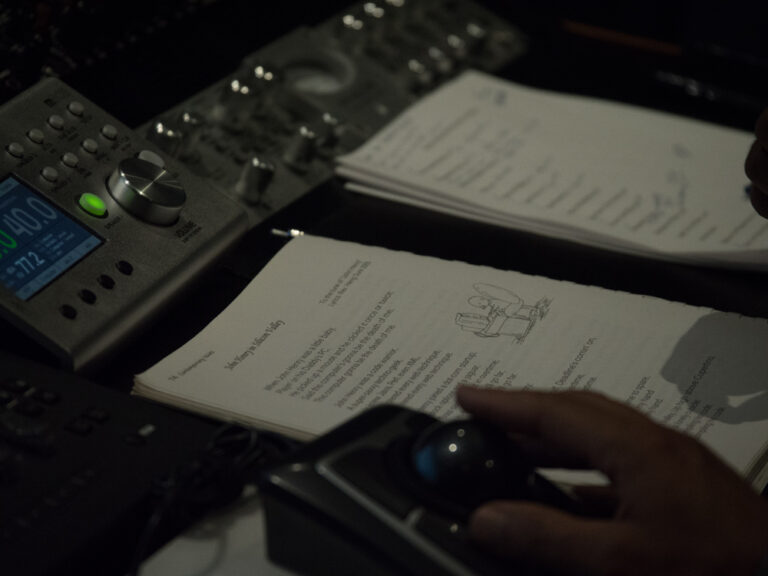
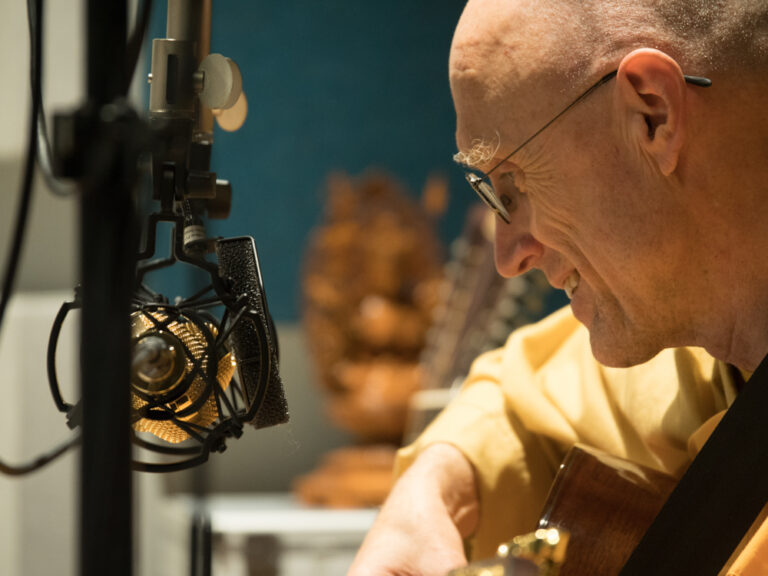
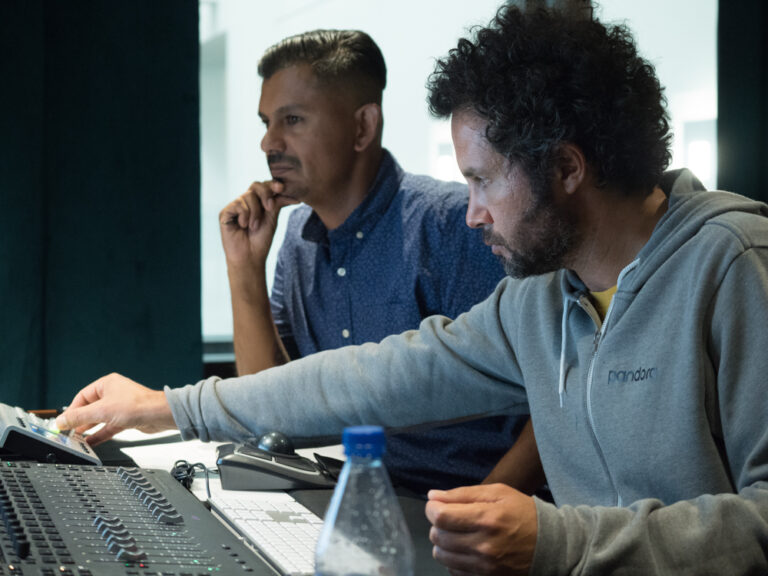
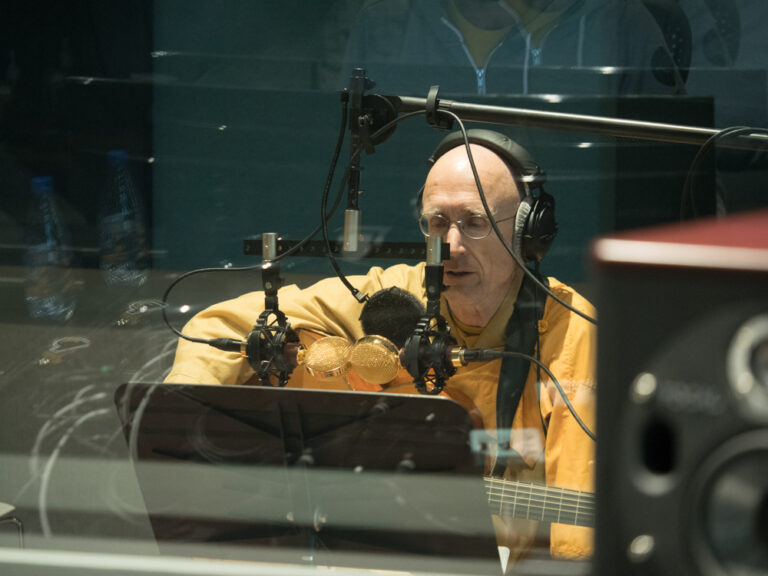
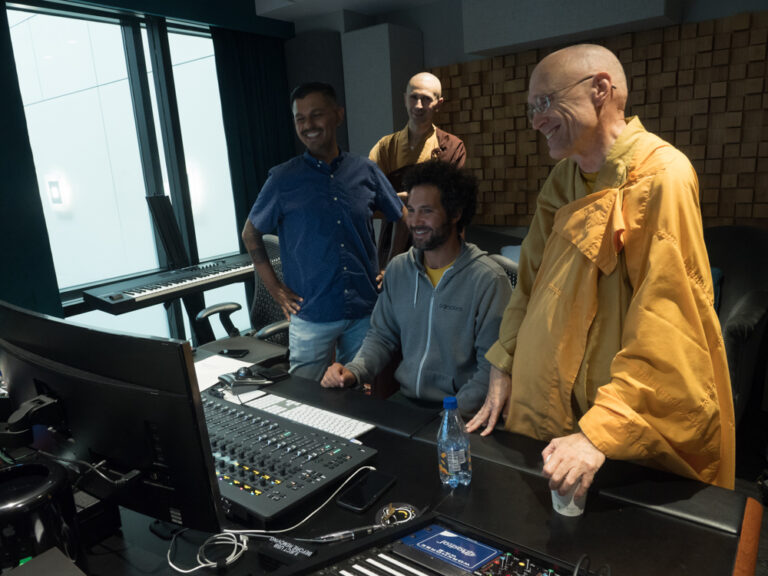
Acknowledgments
Deep thanks to Homero Espinosa, DJ and composer extraordinaire, who introduced me to David Cuetter, whose sensitive ears and outstanding ribbon mics captured the sounds you will hear.
Fabrizio Alberico (https://www.albericoguitar.com/) brought to musical life both the banjo and the guitar I’m playing; profound gratitude to Fab for his generosity of spirit.
Gratitude to Sandy Chiang, Lai Theng Leong, Irene Nakasone, and Jerry Hsu for making dreams into reality.
Website and social media: Loc Huynh, Meghan Sweet, Xuan Ooi.
And deepest bows to the late Chan Master Hsuan Hua, who encouraged a clueless American monk with these words: “You know, in your culture, you have to use everything you have, every skill, to expediently teach the Dharma. In this country, a monk who plays guitar could be really useful!”
For your reference:
Music production: see the table above
Instruments: Fabrizio Alberico
Booklet: Sandy Chiang, Lai Theng Leong, Irene Nakasone, Jerry Hsu
Website and social media: Loc Huynh, Meghan Sweet, Xuan Ooi
Rev. Heng Sure